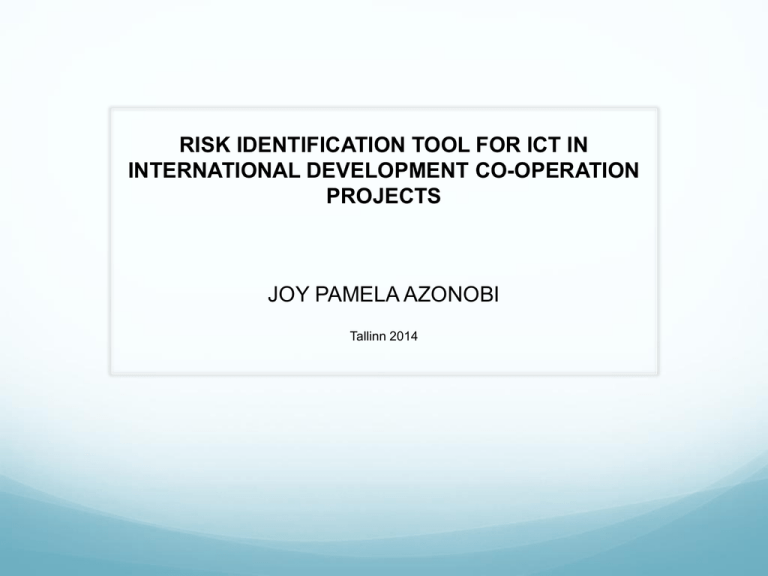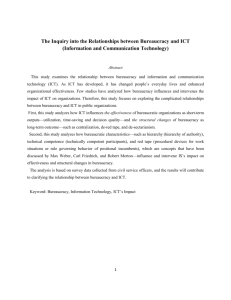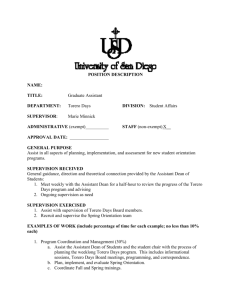risk identification tool for ict in international
advertisement

RISK IDENTIFICATION TOOL FOR ICT IN INTERNATIONAL DEVELOPMENT CO-OPERATION PROJECTS JOY PAMELA AZONOBI Tallinn 2014 OUTLINE DEFINING RISK DEFINING RISK IDENTIFICATION RISK IDENTIFICATION TOOL FOR ICT IN INTERNATIONAL DEVELOPMENT CO-OPERATION PROJECTS CONCLUSION DEFINITION OF RISK RISK- is uncertainty of occurrence of any unforeseen event. Pure risk- always lead to loss. Static risk- result in loss. Speculative risk-may result in loss or gain. Dynamic risk-may result in loss or gain Discovering Defining Risk Identification Documenting and communicating Describing TWO TYPE OF RISK IDENTIFICATION Known risk- the clear effect are unknown but the possibility to harm project outcome is visible. Unknown risk –this are problem that arise suddenly but seasonally they are expected. RISK IDENTIFICATION TOOL FOR ICT IN INTERNATIONAL DEVELOPMENT CO-OPERATION PROJECTS Educational Tools Institutional Tools Sociocultural Tools Environmental Tools Technical Tools Language issue illiteracy EDUCATIONAL TOOL Staffing Security training language issue- inability to communicate in a local language is a weakness that delays project and affecting finally their capacity . illiteracy- lack of education in development studies is a weakness that delays and affect project Staffing- insufficient resources allocated for preparing local staff for the project practices will affect project. security issues- safety of foreign staff, is important for project success. Local bureaucracy Customs and shipping INSTITUTIONAL Economics Corruption & politics Local bureaucracy - frustration can be avoided if the project’s management procedures and staff positions are based on a analysis of the project environment Having local expertise in management of development projects indicates fewer challenges with the necessary bureaucracy. To detailed enough anti-corruption policy is also necessary. Project management Intercultural sensitivity SOCIO-CULTURAL Status symbols Social expectations Intercultural sensitivity - Difficulty coping with the stages of cultural shock is common hindrance for international projects, staff preparedness for those Characteristics, is often crucial for a project’s success, or a failure. Project management –lack of practical project manual, procurement policy. financial, management, fixed-asset policy practical. Geography and climate Health concerns ENVIRONMENTAL Environmental awareness . Transportation The condition of roads, transport vehicles, safety and reliability of traffic, and other environmental issues must also be considered in ICT work in a development cooperation project Climate conditions always affect the design, implementation, and maintenance of ICT installations. Foreign staff health concerns – necessary insurances for medical treatments vaccinations, prophylactic medication, and basic preventive health care practices is necessary. Equipment failures Power stability TECHNICAL Connectivity Maintenance Lack of provision, in case of Equipment failures and procurement of new equipment and spare parts can hinder project. in developing country instability of electric power. Provision for maintenance is also necessary for the project success. CONCLUSION Risk Identification tool is not risk management tool It’s important that you identify all the risks early Continue to identify risk during the project Understand the probability of a risk to occur – risk assessment. Thank You REFERENCES British Standards Institution (2006) Information Security Management Systems. Guidelines for Information Security Risk Management, London: British Standards Institution. Adams, S. (2009) ITIL V3 Foundation Handbook. Norwich: TSO Information and Publishing Solutions Tools and Techniques. Fort Lauredale: J. Ross Publishing. Collier, P. (2007) The Bottom Billion: Why Are the Poorest Countries Failing And What Can Be Done About It? Oxford: Oxford University Press. Ewusi-Mensah, K. (1997) Critical Issues in Abandoned Information Systems Development Projects. What is it about IS Development Projects that Make them Susceptible to Cancellations? Communications of the ACM, 40, 9, 74-80. Center/Research/ResearchDeliverables/Pages/The-Risk-IT-Framework.aspx. Kamppuri, M. (2011) Theoretical and Methodological Challenges of Cross-cultural Interaction Torero, M. & Braun, J. (Eds.) (2006) Information and Communication Technologies for Development and Poverty Reduction. Baltimore: International Food Policy Research Institute. The John Hopkins Universtiy Press.









